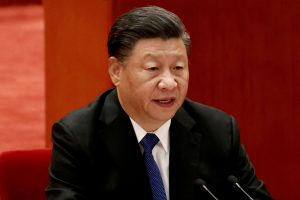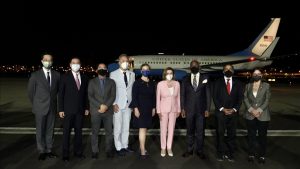It has become quite characteristic of most political parties to be rocked by intra-party crisis during preparations for major elections, especially at the state level. The latest developments that accompanied the Lagos State Chapter of the All Progressive Congress (APC) in its preparation for the July 24 polls into the 20 local government areas and 37 Local Council Development Areas (LCDAs) is an attestation of this in-house divisiveness.
Aggrieved members of the party from Iru-Victoria Island LGA and Lagos Island LGA took to the streets in protest of an alleged imposition of certain choice candidates by some party leaders. They argued that following the decision of the Governor’s Advisory Council (GAC), it was agreed that the indirect primary method will be used during primaries to select those who will fly the party’s flag during the elections.
However, they alleged a ploy by some party leaders to use the consensus method to make it easy for their own preferred candidates to emerge through the backdoor.
Shedding light on the discomfits in Lagos Island, one of the protesters explained that:
“… during the last election, Prince Taorid Ojora stepped down for Toyese Olusi to contest as a loyal party man. When Asiwaju asked him to do so that time, he listened. Now that he wants to contest, Toyese is now plotting to run for another term. This is a man who has been the vice-chairman of the local government for two terms and has been the local government chairman since 2014 with nothing to show for it. Yet his father, Prince Olusi, wants to impose him on us again. We will not take it.”
While threatening to use everything within their power to work against the ruling party if the situation is not addressed, they urged members of the Governor’s Advisory Council (GAC) and the national leader of the APC, Asiwaju Bola Tinubu, to advise party leaders to adhere to the mode of primaries selected for the council polls.
This recurring trend reveals a systemic defect in the structure of political parties in Nigeria that should be corrected. In other climes, political parties are ideological platforms. In the US for instance, there is the Republican Party and the Democrats. Both parties are informed by ideologies which separate the one from the other.
Read Also: Grassroots Development and the Planned Delisting of Local Governments from the Constitution
Individuals who make up the parties share the same ideological interests and beliefs. They see the world through the same eyes and hope to make an impact through the same paradigm.
But in Nigeria, it is a well known fact that political parties are mere platforms to gain political power. Asides the fact that this explains the high level of indiscriminate cross-carpeting that has dominated Nigeria’s space for years, it is responsible for the self-centred attitude of political actors towards the system, as well as why issues like godfatherism, electoral fraud and violence continue to hold sway.
It is rather retrogressive to say the least that certain actors are embroidered in the act of anointing particular candidates and damning all odds to impose them on the people in a democracy and against the backdrop of a modern society.
According to a protester explaining what actually transpired in Iru-Victoria where Hon. Abayomi Daramola was accused of bending the rules to favour Princess Rashidat Abiodun Adu, he noted that Daramola, by virtue of being a member of the APC local government committee, is expected to be neutral, “but he is backing the incumbent chairman, Rashidat Adu.
“When you know you already have a preferred candidate, why then are you allowing others to waste their money buying forms.”
This further highlights the cost of running for electoral offices in Nigeria. For instance, findings reveal that the cost of nomination forms for APC chairmanship aspirants is about N2 million.
If a certain sponsor thus stake their wealth for a particular aspirant and he emerges victorious, wouldn’t that amount to a system of indebtedness where they feel obliged to do the biddings of their political sponsorship?
Such demands may involve stealing public funds to make up for the money thrown into the campaign or placing their cronies in positions where they can share generously from the national cake.
On the one hand, Olusi denied all the allegations of imposition against him as he maintained that his son, Ojora has a right to contest for the chairmanship position of Lagos Island Local Government as well as other elective positions in the state.
Daramola, on the other, said he and other leaders jointly agreed to endorse the incumbent chairman of Iru-Victoria Island after it was agreed that those who have served first term should be given preference to go for second term.
Daramola, however, explained that “As at last Friday, the only person who has picked the chairmanship form is the incumbent chairman. No other person has picked the form. If they claimed others picked the forms, let them supply their names. I am not a member of the screening committee of the party, so how can I disqualify any aspirant?”
Meanwhile, major stakeholders have continued to make propositions and recommendations to sanitise and strengthen Nigeria’a electoral process. Ex-President Goodluck Ebele Jonathan for instance recommended recently that vote inducement be tagged a criminal offence with jail term for offenders.
But these are solutions that will yield no meaningful results because the problems are rather foundational. Except far-reaching measures are taken on issues like godfatherism and the ideological deficit in Nigeria’s political process, these recommendations will only provide temporary solutions.

